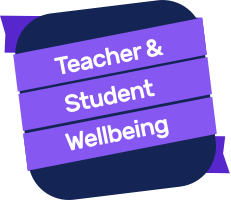Wellbeing
Professional Learning Course – free for Level 4+ Teachers
“Children won’t remember what you tell them but they will always remember how you made them feel.”
– Maya Angelou

Creating a positive classroom/school culture, focused on developing meaningful relationships and supporting you and your community’s wellbeing, is not only central to our collective mental health but is also a prerequisite for effective learning.
This course can be accessed for free by Level 4+ Education Perfect Teachers (view more information about our Teacher Certification program here).
If you have further questions please email [email protected].
Course Overview
The Wellbeing Course will help you develop your own wellbeing practices and look at how these can be simply applied to your classroom. The course contains 8 modules, each representing approximately 1-2 hours of learning and activities.
Welcome: Guided mindfulness
Why Wellbeing?
Relationships
The Mind
Dealing with Stress
Mindfulness
Challenge and the Power of Gratitude
Resilience
Watch Acting Principal of Dover Court International School and Certified Wellbeing Coach, Simon Mann, talk about implementing three approaches to well-being and mental health in schools.
“If we got the proactive [approach to Mental Health and Wellbeing] right, what positive impact might we think that would have on our reactive and responsive approaches?”
The Wellbeing Course can be completed in a group or individually. EP’s powerful feedback and peer review tools can be utilised to provide a collaborative and engaging learning experience for participants. Participants will be supported to create an individual or school-wide action plan for digital transformation.
EP Accredited Training
On completion, participants receive an EP accredited certificate and digital badge.

AITSL Standards
The course can be used as evidence for the following AITSL Standards
Focus Area 1.1 – Physical, social and intellectual development and characteristics of students
Graduate
![]()
Demonstrate knowledge and understanding of physical, social and intellectual development and characteristics of students and how these may affect learning
Proficient
![]()
Use teaching strategies based on knowledge of students’ physical, social and intellectual development and characteristics to improve student learning.
Highly
Accomplished
![]()
Select from a flexible and effective repertoire of teaching strategies to suit the physical, social and intellectual development and characteristics of students.
Lead
![]()
Lead colleagues to select and develop teaching strategies to improve student learning using knowledge of the physical, social and intellectual development and characteristics of students.
Focus Area 1.2 – Understand how students learn
Graduate
![]()
Demonstrate knowledge and understanding of research into how students learn and the implications for teaching.
Proficient
![]()
Structure teaching programs using research and collegial advice about how students learn.
Highly
Accomplished
![]()
Expand understanding of how students learn using research and workplace knowledge.
Lead
![]()
Lead processes to evaluate the effectiveness of teaching programs using research and workplace knowledge about how students learn.
Focus Area 4.1 – Support student participation
Graduate
![]()
Identify strategies to support inclusive student participation and engagement in classroom activities.
Proficient
![]()
Establish and implement inclusive and positive interactions to engage and support all students in classroom activities.
Highly
Accomplished
![]()
Model effective practice and support colleagues to implement inclusive strategies that engage and support all students.
Lead
![]()
Demonstrate and lead by example the development of productive and inclusive learning environments across the school by reviewing inclusive strategies and exploring new approaches to engage and support all students.
Focus Area 4.4 – Maintain student safety
Graduate
![]()
Describe strategies that support students’ wellbeing and safety working within school and/or system, curriculum and legislative requirements.
Proficient
![]()
Ensure students’ wellbeing and safety within school by implementing school and/or system, curriculum and legislative requirements.
Highly
Accomplished
![]()
Initiate and take responsibility for implementing current school and/or system, curriculum requirements to ensure student wellbeing and safety.
Lead
![]()
Evaluate the effectiveness of student wellbeing policies and safe working practices using current school and/or system, curriculum and legislative requirements and assist colleagues to update their practices.

